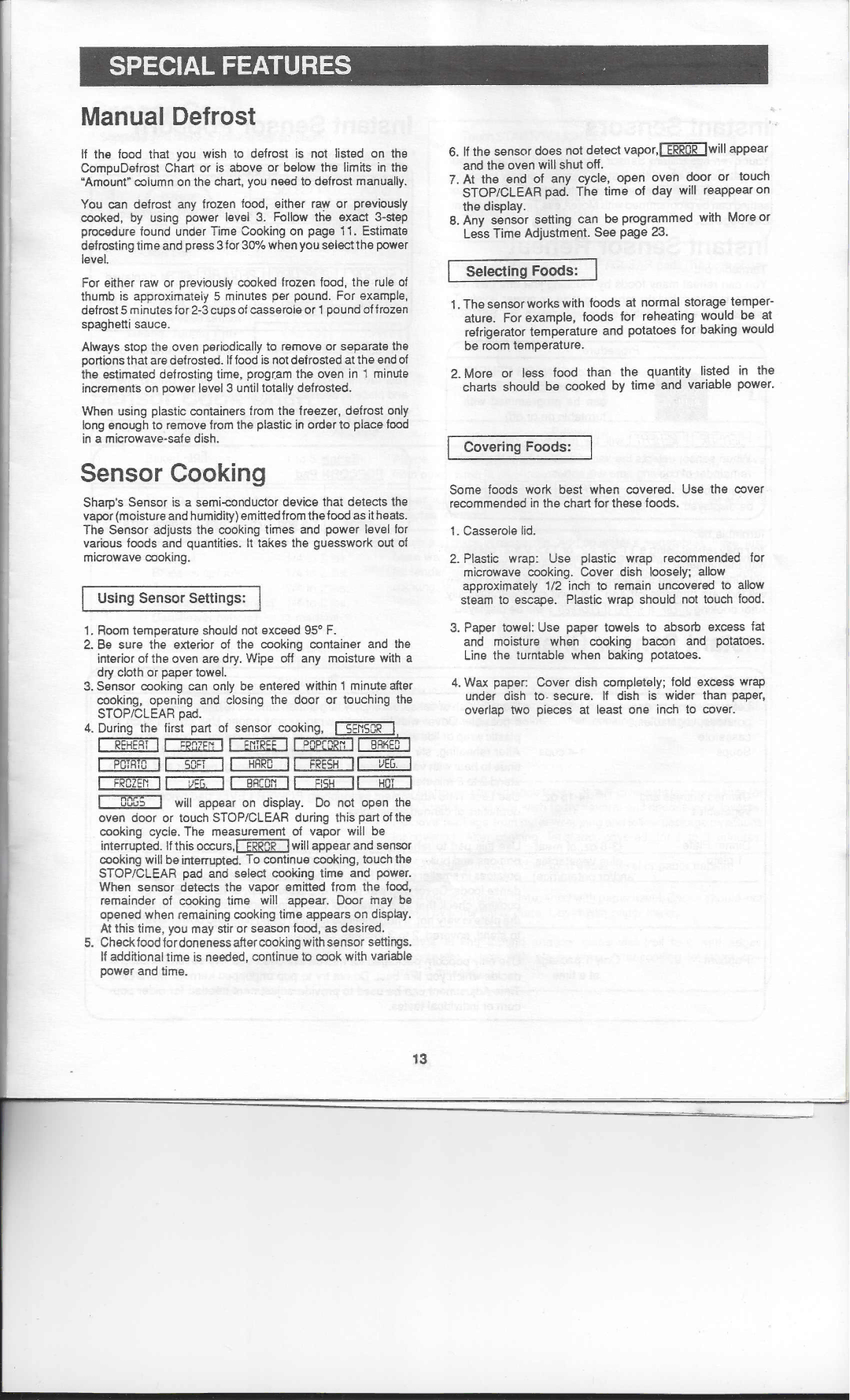
SPECIAL FEATURES
Manual Defrost
If the food that you wish to defrost is not listed on the CompuDefrost Chart or is above or below the limns in the
"Amount" column on the chart, you need to defrost manually.
You can defrost any frozen food, either raw or previously
cooked, by using power level 3. Follow the exact
For either raw or previously cooked frozen food, the rule of
thumb is approximately 5 minutes per pound. For example,
defrost 5 minutes for
Always stop the oven periodically to remove or separate the
portions that are defrosted. Iffood is not defrosted at the end of
the estimated defrosting time, proqrarn the oven in 1 minute
increments on power level 3 until totally defrosted.
When using plastic containers from the freezer, defrost only
long enough to remove trom the plastic in order to place food
in a
Sensor Cooking
Sharp's Sensor is a
The Sensor adjusts the cooking times and power level for various foods and quantities. It takes the guesswork out of microwave cooking.
Using Sensor Settings:
1.Room temperature should not exceed 95° F.
2.Be sure the exterior at the cooking container and the interior of the oven are dry. Wipe off any moisture with a dry cloth or paper towel.
3.Sensor cooking can only be entered within 1 minute after cooking, opening and closing the door or touching the STOP/CLEAR pad.
4. During the first part of sensor cooking, I SE~SOR I
I REHERT I! ~Rmpi I I ~!tTR~E I I POPCORN II BRKED
I POlAlc I I SOFT I I HARD II FRESH I~
FROZEN I! \)~rl I I BRCOrl II FiSH Ic::EQ[
DOGS I will appear on display. Do not open the
oven door or touch STOP/CLEAR during this part of the
cooking cycle. The measurement of vapor will be
interrupted. If this cccurs.] FRROR Iwill appear and sensor cooking will be interrupted. To continue cooking, touch the STOP/CLEAR pad and select cooking time and power. When sensor detects the vapor emitted from the food,
remainder of cooking time will appear. Door may be opened when remaining cooking time appears on display. At this time, you may stir or season food, as desired.
5, Check food fordoneness after cooking with sensor settings. If additional time is needed, continue to rook with variable
power and time.
•
6. If the sensor does not detect vapor,1 ERROR Iwill appear and the oven will shut off.
7.At the end of any cycle, open oven door or touch STOP/CLEAR pad. The time of day will reappear on the display.
8.Any sensor setting can be programmed wnh More or Less Time Adjustment. See page 23.
Selecting Foods:
1.The sensor works with foods at normal storage temper- ature. For example, foods for reheating would be at refrigerator temperature and potatoes for baking would be room temperature.
2_ More or less food than the quantity listed in the charts should be cooked by time and variable power.
Covering Foods:
Some foods work best when covered. Use the cover recommended in the chart for these foods.
1. Casserole lid.
2.Plastic wrap: Use plastic wrap recommended for microwave cooking. Cover dish loosely; allow approximately 1/2 inch to remain uncovered to allow steam to escape. Plastic wrap should not touch food.
3. Paper towel: Use paper towels to absorb excess fat and moisture when cooking bacon and potatoes. Line the turntable when baking potatoes.
4. Wax paper: Cover dish rompletely; fold excess wrap under dish to- secure. If dish is wider than paper,
overlap two pieces at least one inch to cover.
13
